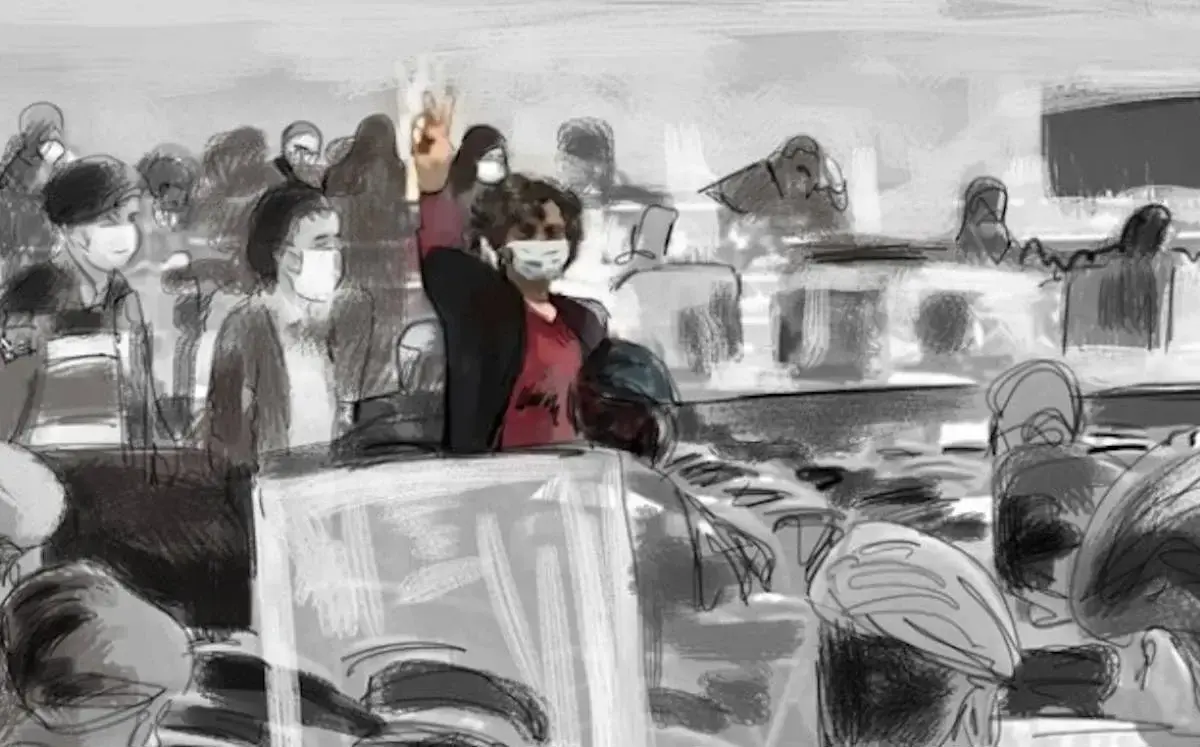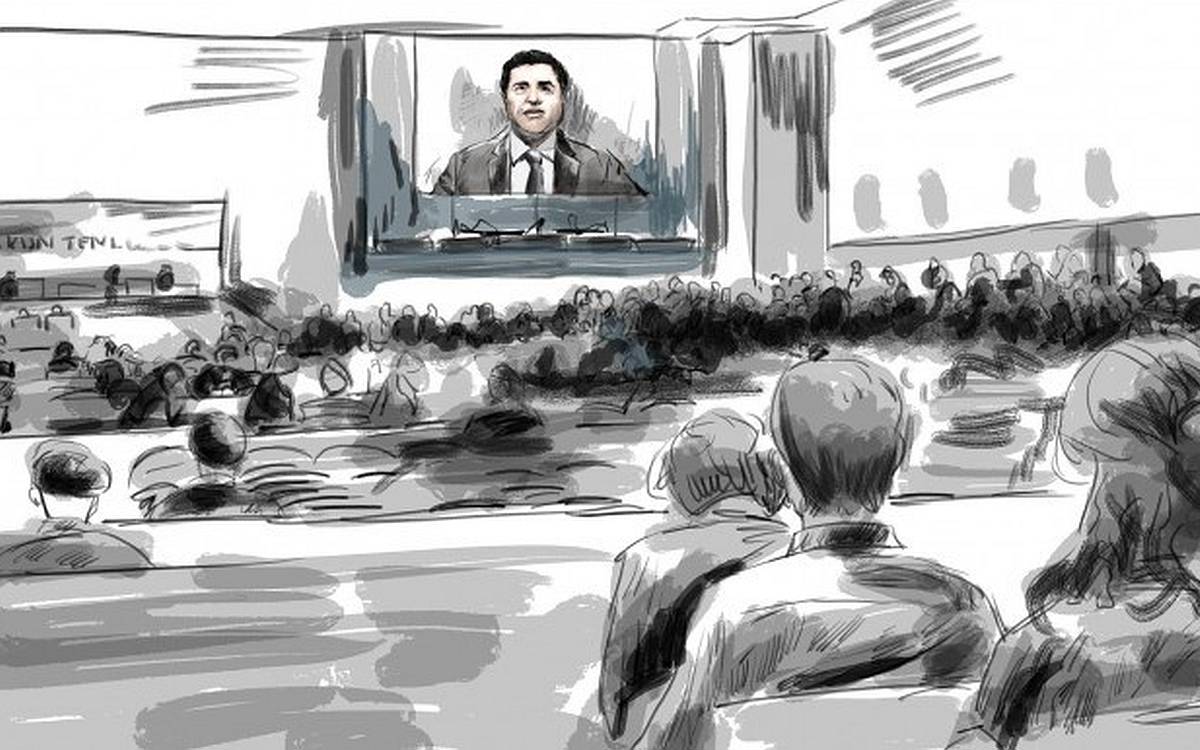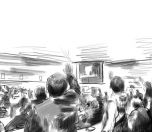As the highly contentious Kobanî trial in Turkey approaches a critical verdict, expected to be pronounced during the hearing to take place on May 16, a collective of 159 signatories, including artists, academics, and politicians, have issued a statement emphasizing the gravity of the impending decision.
The trial, which has been ongoing for four years, involves charges against 108 members of the Peoples’ Democratic Party (HDP), including former leaders and MPs, for crimes including "disrupting the unity and territorial integrity of the state" and "murdering 37 people," among other offenses.
The politicians are accused of orchestrating the 2014 demonstrations in Turkey’s Kurdish-populated cities against ISIS’ attempts to invade Kobanî, a Kurdish town in Syria adjacent to the Kurdish border, upon orders from the outlawed Kurdistan Workers’ Party (PKK). Twenty-seven people were killed when the incidents turned violent in the country’s Kurdish-majority regions. Some individuals lost their lives in conflicts with security forces, while others perished in clashes between HDP supporters and Islamist groups.
The statement by the signatories asserts that the outcome of the Kobanî trial will be a significant indicator of the government's respect for the principle of an independent judiciary, both domestically and internationally. It is seen as pivotal for the future of the country.
The signatories call for the verdict to signal the end of injustice and the beginning of judicial independence in Turkey. They urge for the immediate release of the Kobanî detainees in accordance with the European Court of Human Rights' (ECtHR) decisions and the European Council's Committee of Ministers' resolutions.
Here is the full text of the statement:
The results of the local elections have strengthened society's demand for political softening, and the expectation for peace and tranquility. A key precondition for this expectation and hope to materialize is for the judiciary to transform into an independent institution that administers justice according to the principle of the rule of law stipulated in the Constitution, free from the command of political authority.
In this context, we stand on the brink of a decision that will impact the future of the country. The outcome of the upcoming Kobane Trial will be indicative, both domestically and internationally among proponents of peace and democracy, of whether the government respects the principle of an independent judiciary. This case, like the Gezi Trial, is a critical point demonstrating the use of the judiciary as a political tool. Thus, it holds critical importance not only for the DEM Party and the regional population but also for the future of our country.
The verdict in the Kobane case should signal the end of lawlessness in the country and the attainment of judicial independence. Kobane and similar contrived cases must be resolved in accordance with the requirements of the law. All injustices created by political motives in the legal field, including the baseless convictions in the Gezi Trial, should be remedied.
The necessary course of action is clear: In accordance with the European Court of Human Rights (ECHR) decisions, which are binding for all state bodies, and the decision of the Council of Europe's Committee of Ministers to promptly release Demirtaş and other detainees, the Kobane detainees should be immediately released. It is incumbent upon the government and judiciary to consider the Committee of Ministers' decision, a responsibility that comes with membership in the Council of Europe.
Recent political developments have shown that the politics of tension, injustice, and lawlessness do not provide peace and security to society, nor do they receive approval from the masses. We hope and expect that the decision in the Kobane Case will contribute to the establishment of a rule of law and social peace.
Kobanî battle and protests
In September 2014, ISIS, which controlled a significant portion of Syrian territory at the time, initiated an attack on Kobanî, a Kurdish town in northern Syria, situated near the border with Turkey.
In late September, a group of people went to Suruç, a town neighboring Kobanî in the predominantly Kurdish city of Urfa, and attempted to cross the border. Police prevented them, using tear gas and rubber bullets.
Pictures allegedly showing ISIS militia crossing into Syria were published on the same days.
Also, President Recep Tayyip Erdoğan made statements indicating that they equated the PKK with ISIS. While the wounded coming from Kobanî were kept waiting on the border, the wounded from ISIS were treated at hospitals. Several news reports alleging the fall of the town were denied.
After the HDP made a call to take to the streets against a possible massacre in Kobanî, thousands of people protested in Kurdish-majority provinces as well as Ankara and İstanbul. While left parties also supported these protests, deaths also occurred with the onset of police violence. Street conflicts ensued. 42 people lost their lives from October 6 to 12, 2014.
According to a report by the Human Rights Association (İHD), 46 people died, 682 people were wounded and 323 people were arrested in the protests held between September 7 and 12, 2014. As reported by the AA, 31 people lost their lives, 221 citizens and 139 police officers were wounded.
Here are some of bianet's articles covering the battle of Kobanî and the protests in Turkey:
CLICK - Politicians, NGOs Keep Watch on the Border with Kobanê
CLICK - Writers to Visit Border with Kobanê
CLICK - 'The Government Doesn't Partner Up on Humanitarian Aids'
CLICK - Hard to Be Journalist in Kobane, Police Violence Resumes
CLICK - Scores Cross Border to Kobane For Solidarity
CLICK - University Student Dies in Kobanê
CLICK - Nejat Ağırnaslı, Sociologist, Dies in Kobanê
CLICK - Government Didn't Help Refugees Coming from Kobanê
CLICK - At least 815 People Died in Kobanê
CLICK - 'Privacy' of An ISIS Fighter Vs. Right to Information
CLICK - Detained Kobanê People Attacked With Tear Gas
CLICK - Petition Urges Humanitarian Corridor to Kobanê
CLICK - Twelve Childen Died in Kobane Protests
CLICK - The Aftermath of Kobane in Photos
Signatories
Abdulhakim Daş - Chair of the East Southeast Associations Platform, Abdullah Keskin - Publisher, Abdullah Öncel - President of Urfa Bar Association, Abdülbaki Erdoğmuş - Theologian, Former Member of Parliament for the 21st term, Adnan Özyalçıner - Chair of the Turkish Writers' Union, Author, Ahmet Aykaç - Prof. Dr., Ahmet Çakmak - Prof. Dr., Ahmet Dindar - Lawyer, Ahmet Özdemir Aktan - Prof. Dr., Akın Atalay - Lawyer, Alev Er - Journalist, Translator, Ali Bayramoğlu - Journalist, Author, Ali Bilge - Economist, Ali Haydar Konca - Former Minister of the European Union, Ali Yaycıoğlu - Prof. Dr., Altay Öktem - Author, Arlin Çiçekci - Author, Arzu Başaran - Painter, Atilla Ansal - Prof. Dr., Atilla Dirim - Translator, Aydın Selcen - Author, Diplomat, Aylin Tekiner - Artist, Ayşe Erzan - Prof. Dr., Ayşe Semiha Baban - President of Yaşar Kemal Foundation, Ayşe Sözeri Cemal - Communicator, Ayşegül Devecioğlu - Author, Ayşen Günsu Teker - Screenwriter, Ayşen Şahin - Communicator, Author, Baskın Oran - Prof. Dr., Bengü Üçüncü - Screenwriter, Berrin Sönmez - Retired Lecturer, Binnaz Toprak - Prof. Dr., Former Member of Parliament for the 24th term, Birgül Oğuz - Author, Burhan Sönmez - Author, International PEN President, Burhan Şenatalar - Prof. Dr., Bülend Tuna - Architect, Bülent Atamer - Engineer, Bülent Tekin - Poet, Author, Cafer Solgun - Researcher, Author, Celalettin Can - Spokesperson for the '78 Initiative, Journalist, Author, Cengiz Arın - Academic, Cihangir İslam - Former Member of Parliament for the 27th term, Cuma Erçe - Chair of PSAKD, Çağatay Anadol - Publisher, Çiğdem Koç - Lawyer, Deniz Durukan - Author, Deniz Türkali - Actor, Doğan Bermek - Architect, Ekrem Baran - Theologian, Emine Uşaklıgil - Journalist, Author, Enes Atila Pay - Architect, Ercan Geçmez - General Chair of HBV, Erdal Karayazgan - Engineer, Erdoğan Aydın - Historian, Author, Erdoğan Kahyaoğlu - Author, Ergin Cinmen - Lawyer, Erol Köroğlu - Assoc. Prof. Dr., Ertuğrul Günay - Former Minister of Culture and Tourism, Lawyer, Esat Akçılad - Screenwriter, Esra Koç - Agricultural Engineer, Esra Mungan - Assoc. Prof. Dr., Eşber Yağmurdereli - Lawyer, Fatma Akdokur - Dr. Theologian, Fatma Bostan Ünsal - Human Rights Defender, Ferhat Tunç - Musician, Fethiye Çetin - Lawyer, Fırat Acar - Publisher, Figen Çalıkuşu - Lawyer, Figen Şakacı - Author, Fikret Başkaya - Academic, Author, Fikri Sağlar - Former Minister of Culture and Tourism, State, Gaye Boralıoğlu - Author, Gençay Gürsoy - Prof. Dr., Gülayşe Koçak - Author, Gülhan Türkay - Prof. Dr., Chairperson of the Social Research Foundation, Gülseren Onanç - Activist, Civil Society Volunteer, Gülten Kaya - Music Producer, Gürhan Ertür - Civil Society Volunteer, Hacer Ansal - Prof. Dr., Halil İbrahim Yenigün - Dr. Academic, Hasan Cemal - Journalist, Author, Huri Özdoğan - Prof. Dr., Hülya Ekşigil - Journalist, Hülya Gülbahar - Lawyer, İbrahim Betil - Civil Society Volunteer, İslam Özkan - Journalist, Kadir Akın - Author, Kemal Aytaç - Lawyer, Levent Tüzel - Lawyer, Former Member of Parliament for the 24th term, Ludmila Denisenko - Art Historian, Author, Mebuse Tekay - Lawyer, Mehmet Ali Alpar - Prof. Dr., Mehmet Altan - Prof. Dr., Mehmet Bilal Dede - Author, Mehmet Ural - Political Advisor, Melek Taylan - Documentary Filmmaker, Metin Bayrak - Philosopher, Murat Uyurkulak - Author, Murathan Mungan - Author, Mustafa Aslan - General Chair of ABF, Mustafa Paçal - Advisor, Nahit Eren - President of Diyarbakır Bar Association, Namık Tan - Former Member of Parliament, Retired Ambassador, Nazar Büyüm - Author, Necmiye Alpay - Linguist, Author, Nesim Ovadya İzrail - Author, Nesrin Nas - Politician, Nesrin Sungur - Prof. Dr., Nesteren Davutoğlu - Communication Expert, Neşe Erdilek - Sociologist, Nil Mutluer - Dr., Social Scientist, Nilüfer Tapan - Prof. Dr., Nuray Sancar - Journalist, Author, Nurcan Baysal - Author, Nurhan Süerdem - Author, Nurten Ertuğrul - Financial Advisor, Orhan Alkaya - Director, Poet, Orhan Pamuk - Author, Orhan Silier - Historian, Osman Okkan - Documentary Filmmaker, Oya Baydar - Author, Öget Öktem Tanör - Prof. Dr., Ömer Ceylan - Retired Economist, Ömer Faruk - Author, Ömer Madra - Retired Academician, Ömer Zülfü Livaneli - Musician, Author, Film Director, Özden Uçar - Screenwriter, Rakel Dink - Chairperson of the Hrant Dink Foundation Board of Directors, Reşit Şahin Canbeyli - Prof. Dr., Rezzan Tuncay - Prof. Dr., Rıza Türmen - Former Judge of the European Court of Human Rights, Rojhat Dilsiz - President of Şırnak Bar Association, Saffet Ercan - Dr., Member of Istanbul Medical Chamber Board, Selçuk Erez - Prof. Dr., Selim Ölçer - Dr., Human Rights Defender, Sena Kaleli - Former Member of Parliament for the 24th term, Serdar Arat - Artist, Professor, Sinan Özaraz - President of Van Bar Association, Şahika Yüksel - Prof. Dr., Şanar Yurdatapan - Musician, Human Rights Activist, Şenol Karakaş - Activist, Talat Kırış - Prof. Dr., Tatyos Bebek - Dentist, Temel İskit - Retired Ambassador, Tuğrul Eryılmaz - Journalist, Turgut Öker - Honorary President of AABK, Ümit Aktaş - Author, Ümit Biçer - Prof. Dr., Ümit Kıvanç - Journalist, Author, Ünal Ünsal - Retired Ambassador, Viki Çiprut - Journalist, Yakın Ertürk - Prof. Dr., Yakup Uygun - Photographer, Yavuz Ekinci - Author, Yektan Türkyılmaz - Assoc. Prof. Dr., Yeşim M. Atamer - Prof. Dr., Zafer Aydın - Author, Zehra Arat - Prof. Dr., Ziya Halis - Former Minister of Labor and Social Security.
(EMK/VK)







.jpg)

.jpg)
